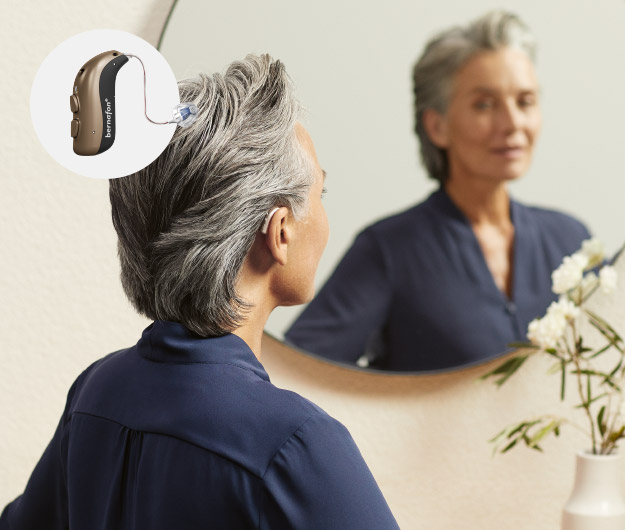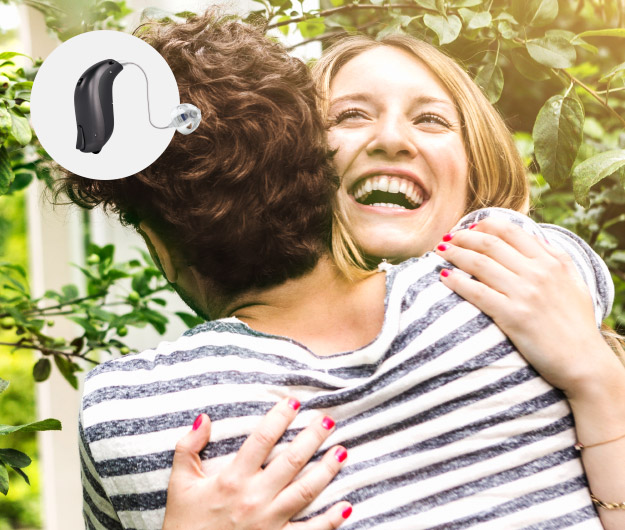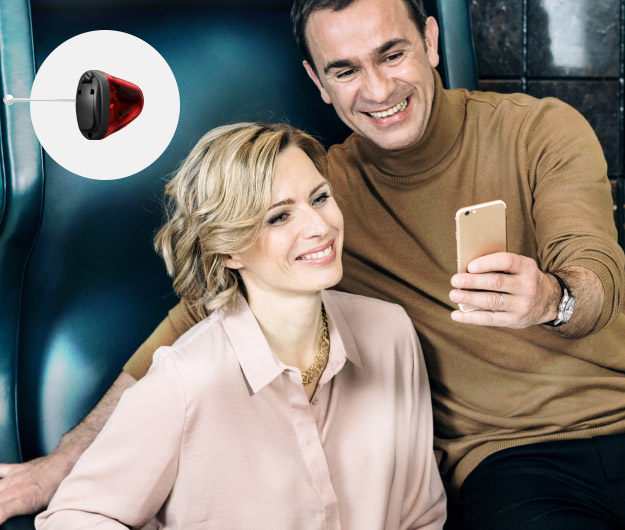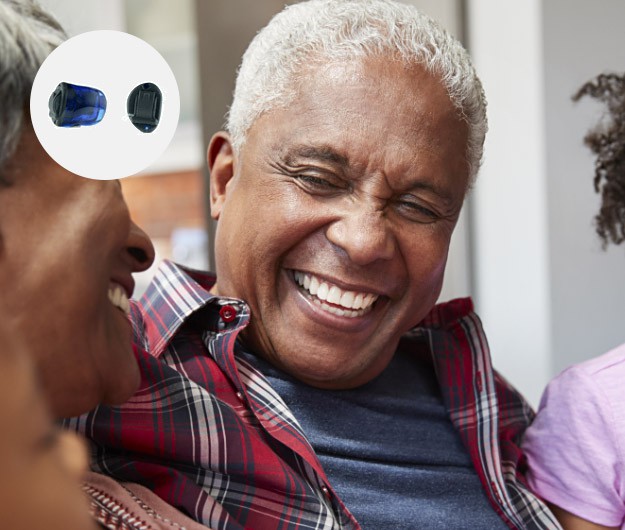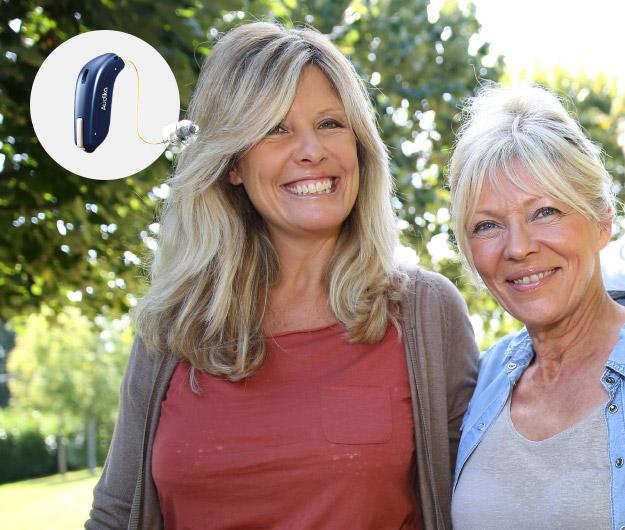
Hearing aids for tinnitus
Tinnitus (ringing in the ears or head) is a common symptom of hearing loss. Did you know that an estimated 90% of people with tinnitus have some degree of hearing loss?1
There are many ways to alleviate tinnitus symptoms, and hearing aids can be one of the most effective tools for that.
Hearing aids can help alleviate tinnitus
In a 2017 study, nearly all participants with both hearing loss and tinnitus experienced a reduction in tinnitus symptoms with the use of hearing aids.2
Hearing aids help you access meaningful sounds by amplifying them, which allows you to shift your attention from the tinnitus to what's important to you and living the life you want.
Also, some of today's hearing aids have sound therapy programs built into them, which can provide additional relief for those who experience tinnitus.
Learn
about the causes of tinnitus

Online Tinnitus Test
People with this condition often experience hearing loss too. Our quick online test can help you test for tinnitus and understand what you can do about it if you have tinnitus/hearing loss.
Your result:
Indications of tinnitus and hearing loss
Book a FREE hearing test in a clinic near you
Book FREE hearing test* The result of the test may only be used for guidance. Official conclusions about hearing loss/tinnitus can be provided by our certified hearing care experts.
Your result:
Indications of hearing loss
Book a FREE hearing test in a clinic near you
Book FREE hearing testYour result:
Symptoms of tinnitus indicated
* The result of the test may only be used for guidance. Official conclusions about hearing loss/tinnitus can be provided by our certified hearing care experts.
Your result:
No tinnitus or hearing loss indicated
Your answers indicate that you do not have tinnitus - or that you have non-bothersome tinnitus that is not currently affecting your everyday life. If you experience symptoms of tinnitus in the future, we recommend visiting your local health care provider.
* The result of the test may only be used for guidance. Official conclusions about hearing loss/tinnitus can be provided by our certified hearing care experts.
How can hearing aids help with tinnitus?
You may be wondering, do hearing aids help with tinnitus? Are there hearing aids for tinnitus? Or can a hearing aid stop tinnitus? In many cases, wearing one of these devices can reduce the symptoms of this condition often to a level where those suffering from tinnitus are barely able to hear it. Hearing aids are capable of controlling several elements of your hearing, thanks to innovations in hearing aid technology. With various brands and styles, a solution from your hearing care professional is likely available to those suffering from tinnitus symptoms.
Hearing cars driving by, drops of rain, and footsteps more clearly can help filter out or even cover up the ringing or buzzing. Some hearing aids also have Bluetooth capabilities or white noise options, so you can listen to some kind of sound no matter the time of day. With your brain stimulated by these noises, it can help reteach your mind which signals to deliver and which ones to ignore.
One of the main complications of living with tinnitus is stress, which can cause your condition to flare up, becoming increasingly difficult to manage. As a result, you’ll likely be left frustrated and fatigued. Wearing hearing aids can reduce your stress levels as you will not be missing out on communication and everyday sounds, thereby feeling more in control of your sensory experience.
Since tinnitus can also affect your sleep because the sound you hear may be increasingly difficult to ignore at night, learning to live day-to-day with hearing aids may help lessen its impact in the evening. It is recommended you remove your hearing aids before going to bed for safety purposes, but your brain may learn to quiet these noises since its ability to do is being stretched and flexed during the daytime. You’ll also likely be more engaged in everyday activities, enjoy a profound sense of calmness, and may notice sounds you have not experienced in a long time.
It is important to note that hearing aids are not a cure for tinnitus. They can only provide auditory stimulation to help with the uncomfortable symptoms of this condition.
Learn about the different ways to get relief from tinnitus.

What are the best hearing aid styles for tinnitus?
1. Behind-the-ear hearing aids
Hearing aids that sit behind your ears are one of the best types of hearing aids for people with tinnitus because they do not block the ear canal, which is important for tinnitus management. BTE hearing aids sit behind the ear and have a wire that enters the ear canal.
The smallest behind-the-ear hearing aid style is called miniRITE. It has a small, soft silicone cap that fits comfortably in the ear, allowing sound to move naturally and comfortably into the ear canal.
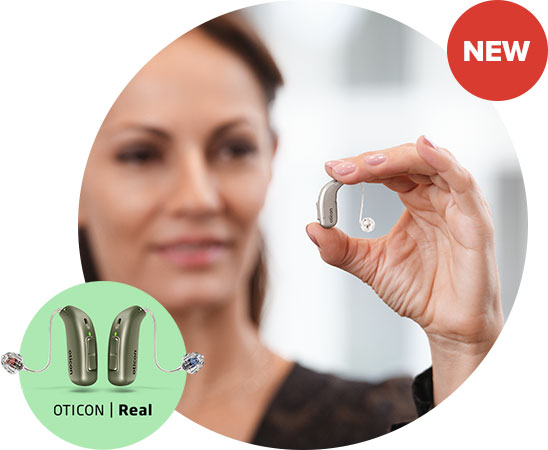
2. Hearing aids with built-in sound therapy
Modern hearing aids can do so much, including helping you take control of your tinnitus. Many of today's hearing aid models can help relieve your tinnitus in an additional way—that is with built-in sound therapy.
Oticon's SoundSupport™ is one of the latest tinnitus support technologies, providing a range of soothing, customizable tinnitus relief sounds, such as white, pink, and red noise, as well as natural, ocean-like sounds.
Browse our selection of hearing aids that offer tinnitus features:
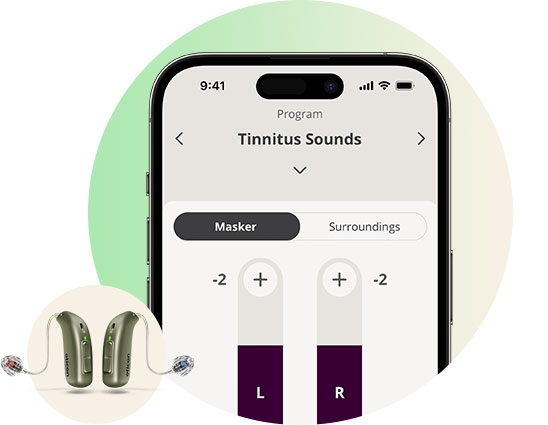
If you experience sudden onset of hearing
loss or tinnitus, contact an ENT doctor today.
Sources
1. https://hearinghealthfoundation.org/hearing-loss-tinnitus-statistics
2. Henry, J. A., McMillan, G., Dann, S., Bennett, K., Griest, S., Theodoroff, S., & Saunders, G. (2017). Tinnitus management: Randomized controlled trial comparing extended-wear hearing aids, conventional hearing aids, and combination instruments. Journal of the American Academy of Audiology, 28(06), 546-561.
3. Simonetti, P., Vasconcelos, L. G., & Oiticica, J. (2018). Effect of fractal tones on the improvement of tinnitus handicap inventory functional scores among chronic tinnitus patients: an open-label pilot study. International archives of otorhinolaryngology, 22(04), 387-394
4. McNeill, C., Távora-Vieira, D., Alnafjan, F., Searchfield, G.D., Welch, D. (2012). Tinnitus pitch, masking, and the effectiveness of hearing aids for tinnitus therapy. International Journal of Audiology, 51, 914-919.

